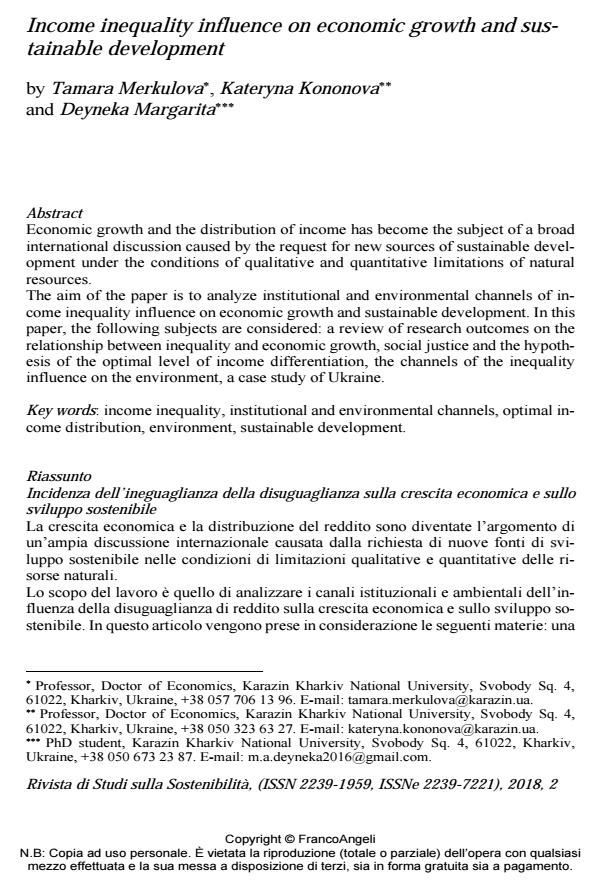Income inequality influence on economic growth and sustainable development
Journal title RIVISTA DI STUDI SULLA SOSTENIBILITA'
Author/s Tamara Merkulova, Kateryna Kononova, Margarita Deyneka
Publishing Year 2019 Issue 2018/2 Language English
Pages 17 P. 27-43 File size 251 KB
DOI 10.3280/RISS2018-002003
DOI is like a bar code for intellectual property: to have more infomation
click here
Below, you can see the article first page
If you want to buy this article in PDF format, you can do it, following the instructions to buy download credits

FrancoAngeli is member of Publishers International Linking Association, Inc (PILA), a not-for-profit association which run the CrossRef service enabling links to and from online scholarly content.
Economic growth and the distribution of income has become the subject of a broad international discussion caused by the request for new sources of sustainable development under the conditions of qualitative and quantitative limitations of natural resources. The aim of the paper is to analyze institutional and environmental channels of income inequality influence on economic growth and sustainable development. In this paper, the following subjects are considered: a review of research outcomes on the relationship between inequality and economic growth, social justice and the hypothesis of the optimal level of income differentiation, the channels of the inequality influence on the environment, a case study of Ukraine.
Keywords: Income inequality, institutional and environmental channels, optimal income distribution, environment, sustainable development.
- Adams R. (2003). Economic Growth, Inequality, and Poverty – Findings from a New Data Set. The World Bank Policy Research Working Paper, 2972, -- available at SSRN: http://ssrn.com/abstract=636334.
- Ahluwalia M.S. (1976). Inequality, Poverty and Development. Journal of Development Economics, 3: 307-342.
- Baland J.-M., Bardhan P., Bowles S. (eds.) (2007). Inequality, Cooperation, and Environmental Sustainability, Oxford: Oxford University Press.
- Bigsten A., Levin J. (2001). Growth, Income Distribution, and Poverty: A Review. WIDER Working Paper Series 129. World Institute for Development Economic Research (WIDER), Helsinki.
- Bowles S. (2012). The New Economics of Inequality and Redistribution. Cambridge: Cambridge University Press.
- Bowles S., Foley D. (2006). Coordination, Conflict, and Competition: a Text in Intermediate Microeconomics. Taylor.
- Bowles S., Gintis H. (2011). A Cooperative Species: Human Reciprocity and Its Evolution. Princeton University Press, Princeton.
- Boyce J.K. (2007). Inequality and Environmental Protection, in Baland J.-M., Pranab B., Bowles S. (eds.). Inequality, Cooperation, and Environmental Sustainability, pp. 314-348, Oxford: Oxford University Press.
- Deininger K., Squire L. (1996). A New Data Set Measuring Income Inequality. World Bank Economic Review, 10: 565-591.
- Deininger K., Squire L. (1998). New Ways of Looking at Old Issues: Inequality and Growth. Journal of Development Economics, 57: 259-287.
- Dorling D. (2010b). Social Inequality and Environmental Justice. Environmental Scientist, 19(3): 9-13.
- Dorling D. (2014). Inequality and the 1%. London and New York: Verso Books.
- Eurostat (2018). -- Retrieved from: http://ec.europa.eu/eurostat.
- Fields G. (2001). Distribution and Development: A New Look at the Developing World. Cambridge: Russel Sage Foundation and MIT Press.
- Global Footprint Network (2018), Open Data Platform. -- Retrieved from: http://data.footprintnetwork.org/#/.
- Islam N. (2015). Will Inequality Lead China to the Middle Income Trap? UN-DESA Working Paper No. 142 (June).
- Islam N. (2015). Inequality and Environmental Sustainability. DESA Working Paper No. 145 (August).
- Kuznets S. (1955). Economic Growth and Income Inequality. American Economic Review, 45, 1-28.
- Lustig N., Arias O., Rigolini J. (2002). Poverty Reduction and Economic Growth: A Two-Way Causality. Sustainable Development Department Technical Paper Series, 111, Washington, D.C.: Inter-American Development Bank.
- Mackenzie H., Messinger H., Smith R. (2008). Size Matters: Canada’s Ecological Footprint, by Income. Canadian Centre for Policy Alternatives, Toronto.
- Merkulova T. (2016). Fairness, Inequality and Economic Efficiency: Analyses and Modeling Relationships. Economic Theory, 4: 77-86.
- Mikkelson G.M., Gonzalez A., Peterson G.D. (2007). Economic Inequality Predicts Biodiversity Loss. PLoS ONE, 2(5), e444.
- Milanovic B. (1994). Determinants of Cross-Country Income Inequality: An Augmented Kuznets’ Hypothesis. World Bank Policy Research Department Working Paper 1246, World Bank, Washington, D.C.
- Piketty T. (2014). Capital in the 21st Century. Cambridge: Harvard University Press.
- Ravallion M. (1995). Growth and Poverty: Evidence for Developing Countries in the 1990s. Economic Letters 48, 411-417.
- Ravallion M. (1997). Can High-Inequality Developing Countries Escape Absolute Poverty? Economics Letters, Vol. 56 (September), 51-57.
- Ravallion M., Lyn S., Michael B. (1996). Equity and Growth in Developing Countries: Old and New Perspectives on the Policy Issues. Policy Research Working Paper Series 1563, Washington, D.C.: World Bank.
- Rawls J. (2005). Political Liberalism. New York: Columbia University Press, 182-183.
- Schultz T.P. (1998). Inequality in the Distribution of Personal Income in the World: How Is It Changing and Why? Journal of Population Economics, 11(3): 307-344.
- Stiglitz J. (2012). The Price of Inequality: How Today’s Divided Society Endangers Our Future. United States, W.W. Norton & Company, 560.
- UkrStat (2018), Statistics. -- Retrieved from: http://www.ukrstat.gov.ua/.
- Wilkinson R& Pickett K. (2010). The Spirit Level: Why Equality is Better for Everyone. New York: Penguin Books Ltd.
- WorldBank (2018). -- Retrieved from: http://www.worldbank.org/.
Tamara Merkulova, Kateryna Kononova, Margarita Deyneka, Income inequality influence on economic growth and sustainable development in "RIVISTA DI STUDI SULLA SOSTENIBILITA'" 2/2018, pp 27-43, DOI: 10.3280/RISS2018-002003